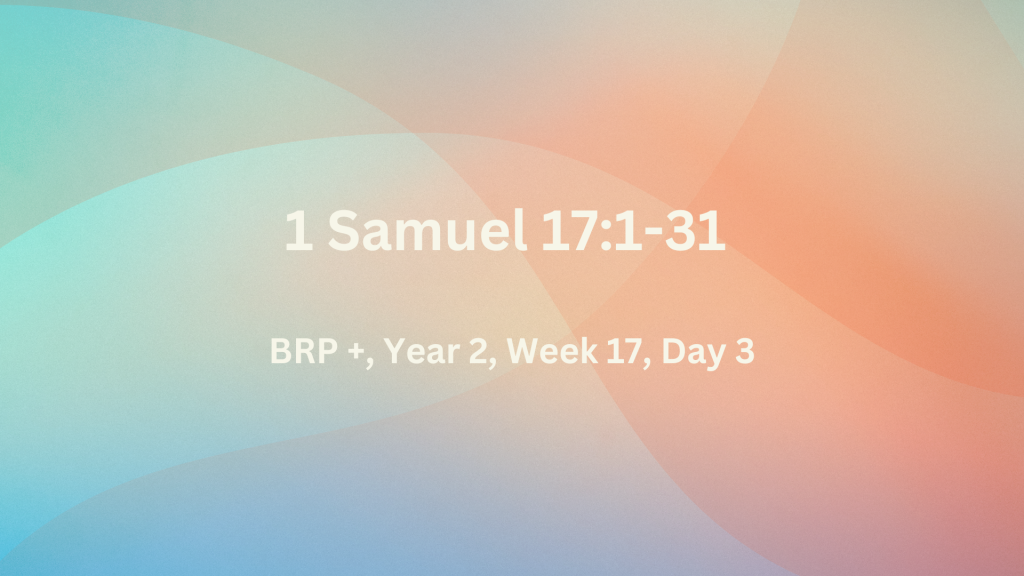1 Samuel 17:1-31
Q.1. Where was the battle being fought? Who was Goliath? How was he described? What was his challenge to Israel? Why were Saul and the Israelite army filled with fear? – (1 Sam.17:1-11)
The Philistines had encroached on the territory belonging to Judah (1 Sam.17:1). This was the ideal place for the fear tactics used by the Philistines, who – … stood on the mountain on one side while Israel stood on the mountain on the other side, with the valley between them (1 Sam.17:3). Goliath was a nine feet tall giant. [He had a giant brother and four sons, all of whom were giant men (c.f. 2 Sam.21:18-22; 1 Chron.20:4-8). It has been suggested that David selected five stones for his sling (1 Sam.17:40) to kill the four sons of Goliath if need be. The strategy of the Philistines was fear. It certainly worked, with Goliath shouting his threats. Morning and evening for forty days, Goliath taunted Israel’s soldiers (1 Sam.17:11, 16, & 24). The Philistines had mastered blacksmithing, so could make armoury, and implements of war (1 Sam.13:19). Goliath would have looked totally intimidating in his massive armour, and his weapons (1 Sam.17:5-10). The terms of war posed by the Philistines gave them a huge advantage, as long as Israel looked at the human opposition, and failed to reckon on God.
Q.2. What do we learn about David? Was he still employed by Saul? Where was the rest of the family? How long were the fear tactics used in the battle? What did Jesse want David to do? – (1 Sam.17:12-19)
David was the youngest of the eight sons of Jesse from Bethlehem in Judah, not far away (1 Sam.17:12). David had previously been employed to minister to King Saul in his demonic depression (1 Sam.16:14-23). However, Saul and his army had gone out to the valley of Elah to fight the Philistines, so – David went back and forth from Saul to tend to his father’s flock at Bethlehem (1 Sam.17:15). David’s three older brothers were part of Saul’s army (1 Sam.17:13). Jesse sent David with some provisions that included a supply of roasted grain, ten loaves of bread, and ten cuts of cheese for the commander of his brothers’ battalion (1 Sam.17:17-18). Mainly, Jesse wanted an update on the welfare of his sons (1 Sam.17:18). The standoff between the Philistines and Israel had already lasted forty days (1 Sam.17:16, 19).
Q.3. Did David dessert his flock? What was David doing at the battle front? What was promised to whomever defeated Goliath? How did his brothers view David? What stirred David into action? – (1 Sam.17:20-31)
David would prove to be a leader who combined the heart of (i) a servant of God, (ii) a shepherd of people, and (iii) a steward of tasks. He did not abandon his father’s flock but entrusted them a keeper (1 Sam.17:20 c.f. Acts 20:28; 1 Pet.5:2-4). David had clearly been involved in military conflict as Saul’s armour-bearer (1 Sam.16:21). He left his baggage with a keeper, and then went out confidently to the battle front to find his brothers (1 Sam.17:22). While David was speaking with his brothers, Goliath appeared on the scene berating the Israelites (1 Sam.17:23). The Israelite soldiers retreated in fear. However, David did not share their perspective, and boldly declared to the soldiers – who is this uncircumcised Philistine, that he should taunt the armies of the living God (1 Sam.17:26). He had been informed about King Saul’s offer – that the king will enrich the man who kills him with great riches and will give him his daughter and make his father’s house free in Israel (1 Sam.17:25). However, it was the insult to God that motivated David to act (1 Sam.17:26, 36, 45-47). His oldest brother turned in anger against David when he expressed his views (1 Sam.17:28). The brother would have been jealous of God’s preference of David over him, and David’s promotion to King Saul’s inner circle (c.f. 1 Sam.16:6-7, 13, 21-23). However, David was not easily swayed from his concern for the honour of God’s name (1 Sam.17:29-30).

